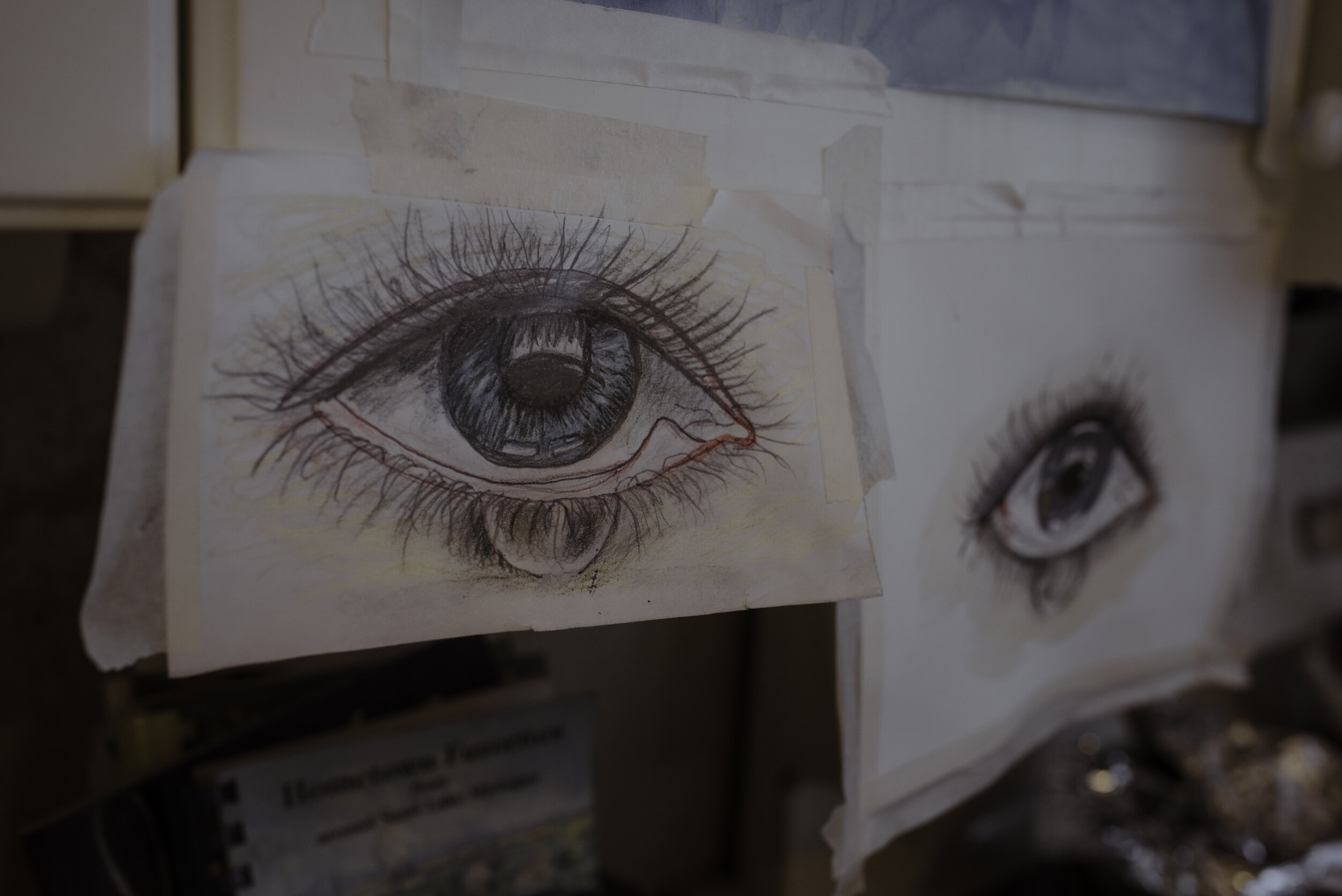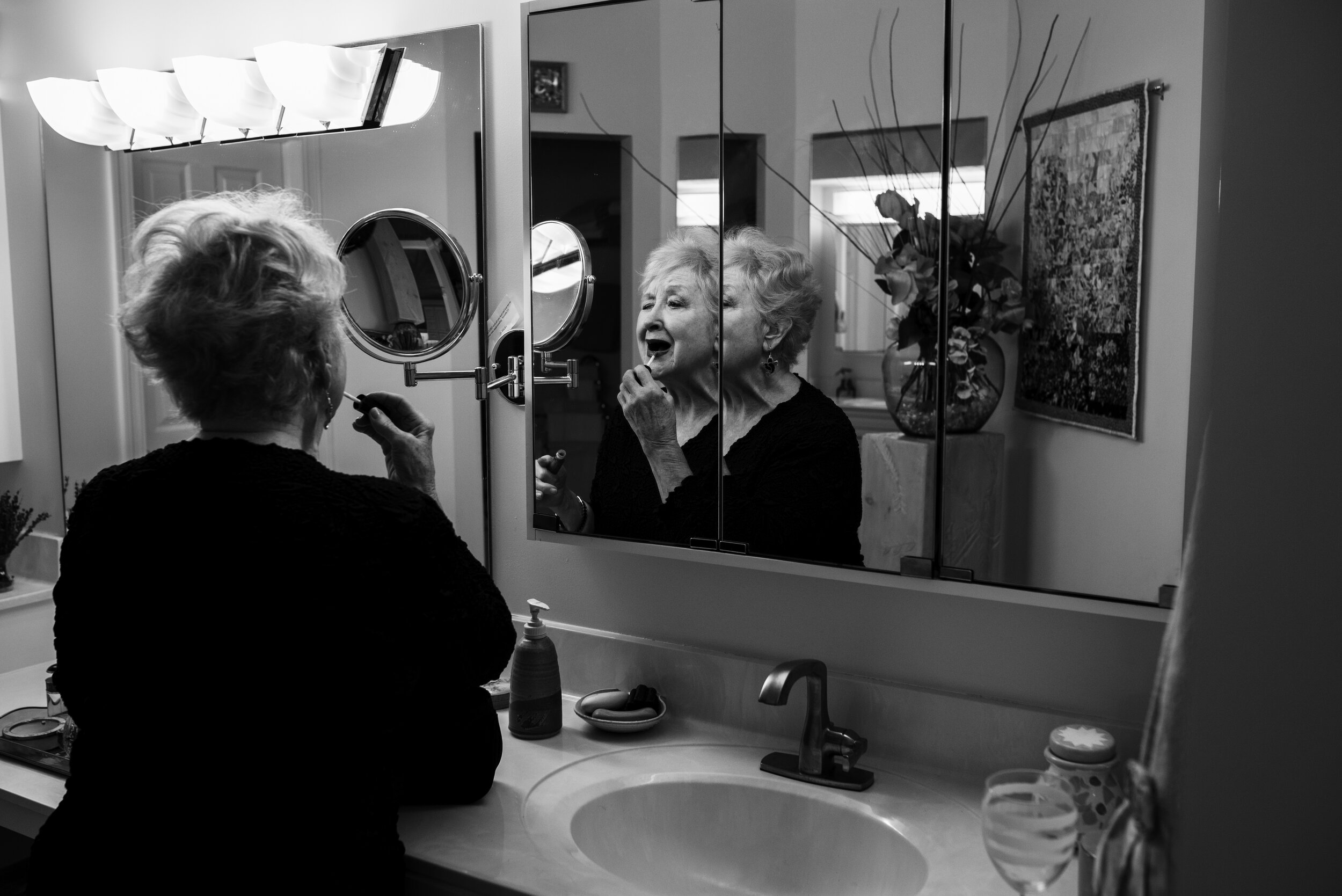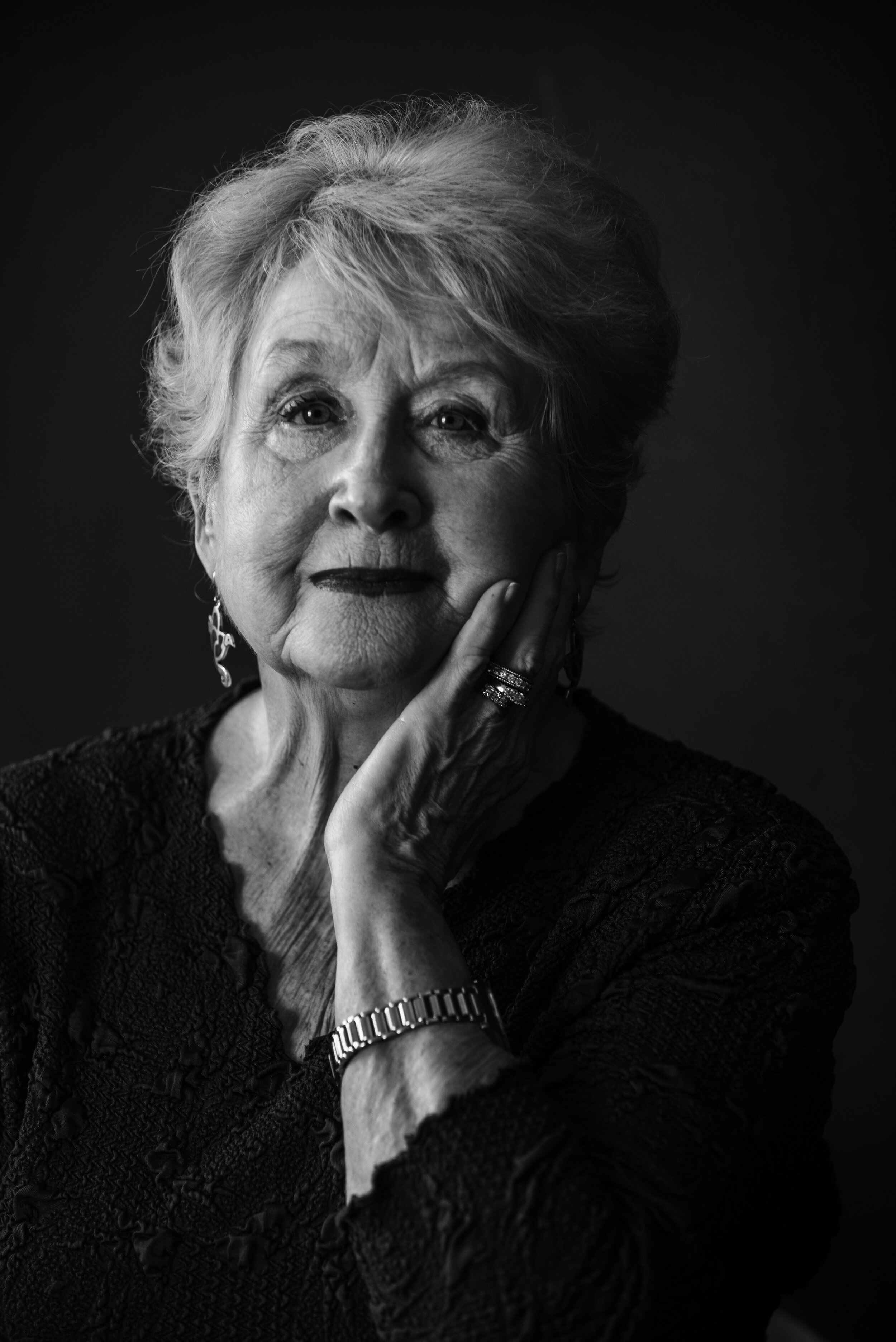I first met her nearly 15 years ago at the Grand Traverse Resort, when she would come in for her regular swims and water aerobics throughout the week. The first thing that struck me about Dorothy McCormick was her magnetic spunk and sharp wit, and a outrageously unabashed sense of style that makes her stand out in any crowd. It's always a good day when I see Dorothy blow through the doors of the health club on a winter day, fuzzy white cossack hat bobbing as she makes her way to the pool with that usual confident spring in her step. On any given day, you can expect to see Dorothy in a lush fur and string of pearls, her light blue eyes shielded by a pair of massive, starlet-esque shades. The woman is a legend in her own right.
I knew from the moment I met her that she and I would be kindred spirits, so I was incredibly excited when she agreed to let me photograph her. Since my goal was to capture her spirit honestly in these photographs, I wanted to first understand what makes her tick. To hear her tell her story. It’s a really intimate experience to photograph someone candidly in their home, so it helps to approach with open ears and fluid expectations. On the day of our visit, Dorothy welcomes me into her airy condo with a warm hug, and we sit down in her kitchen together to a wheel of scrumptious looking baked brie. I quickly discover that Dorothy is very transparent person. Her view of the world is one of knowing optimism, and she looks back on her life with a sense of gratitude that is palpable in her words. As she pours me a glass of the local white that she picked up especially for my visit, she tells me that she was excited for the excuse to grab a bottle, since she’s given up drinking by herself these days. When her husband Bill passed away almost two years ago, dealing with the loss and loneliness was easier managed with a drink or two. Before she realized, her coping mechanism had become its own pitfall. “The grief just overtakes you. It’s like a frog in boiling water; It was so easy to go down that spiral without even being aware of it.” Her breaking point came one day when her oldest granddaughter was visiting. Dorothy blacked out after her second or third hummer on an empty stomach, and woke to find her granddaughter shaking her and calling out to her, a look of sheer panic on her face. Recounting that look of fear, fear that she herself caused her precious granddaughter, clearly pains Dorothy. It was a harsh wake up call for her, and she resolved that it would never happen again. “It’s a very common struggle for people when they lose a spouse,” she says earnestly. “If you don’t get a hold of yourself, if you don’t decide that you want to go on with your life, you can easily follow your spouse into the grave in no time flat. And I don’t want that, I want to be here for my kids.” Since that day, she spends time with friends in her neighborhood and church who have also lost spouses. A support system helps to keep the loneliness and at bay. “And besides,” she says with a wry smile, “my doctor says I’ve got another twenty years in me!”
Dorothy’s sunny kitchen is strewn with painting supplies and paintings in various stages of progress. Some still life, some portraits of people, and a couple of impressive close-up studies of lone eyes brimming with tears. Dorothy jokes with a dismissive wave that she is a “wannabe” artist, but I can see her passion jumping off of each canvas at me. Dorothy first discovered that she could draw and paint scenes from memory while she was working with special needs elementary students early in her career. This became a powerful medium she used to communicate with and help her students, and it has remained a big part of her life ever since. Her tables and windowsills are bedecked with her most prized possessions – photographs of her three children and their children, portraits of her and her late husband Bill looking glamourous in the prime of life, various snapshots of moments in time frozen in frames. Dorothy recounts how she met Bill at a friend’s Christmas party when they were both in their early twenties. As he made a move to come talk to her in the middle of a crowd of people, he tripped, spilling his drink on her blouse. “I remember thinking that he literally fell for me, big time”, she laughs. They were married just 10 months later.
Their love story, though idyllic in photographs, was often fraught with pain for Dorothy. She shares some candid glimpses into some of the struggles she faced during their long marriage, conveying the vivid emotions associated with those memories. At one point, she pauses to look out the window. With eyes welling and a tremble in her voice, she says, “But, you know….I really loved that guy.” A few moments of silence follow, thick with emotion, and I struggle to hold back my own tears as she gingerly dabs at her eyes with a cocktail napkin. “Ours was a typical marriage, I’m sure,” she says. “There were tough spots, but what matters is that we survived. We made it.” For better or for worse, 58 years. She stood by his side until the very end, caring for him as his mind and body deteriorated. Even though she admits to occasionally questioning how she handled all of it at the time, Dorothy is grateful for her life with Bill and the legacy it has brought her in their children. “He was truly my first joy, and my last.”
As Dorothy has watched her own children grow and start families of their own, she has developed a growing interest in her own heritage. Her Jewish great-great grandparents emigrated from Austria and Hungary in 1903. Witnessing the early stages of Hitler’s rise, they took their cue to leave Europe for the States. With only 65 dollars to their name, they were the wealthiest immigrants on their ship’s register. She goes on to tell me about her other relatives spread out across the UK, even Iceland. “That’s why I’m so easy to get along with, I’m a mutt!” She laughs. “When you have a different perspective, you can empathize with more people.”
By the time we’ve finished our wine and a good portion of the brie, Dorothy has laid out some very private corners of her life like an open book. I’m inspired, not only by her stories, but by the way the sum of her experiences has culminated in vulnerability and grace instead of the bitterness that can so easily find roots in a human heart. Dorothy and I migrate into her bedroom, and I watch as she applies lipstick in front of her generously sized vanity to prepare for her close up. She jokes, “I’m using a more conservative shade, so my lips don’t enter the room before Dorothy does.” Maybe it’s the combination of her humorous self-awareness and the image of her standing there perfecting her lipstick in the mirror with all the poise of a grand duchess, but I’m suddenly transported back to my childhood, and so many quiet mornings spent watching my grandmother get herself ready for a day out together.
Before I left for the evening, Dorothy gifted me a book from her library, a beautiful collection of photography using candid photos to tell the stories of families and the deep bonds they share. Inside the front page, she wrote, “Thank you for sharing your passion with me.” What a mutual gratitude that was.
That evening, I had the chance to ask Dorothy for a priceless gift: A single piece of wisdom, something that she wants me to carry through life. I loved her answer.
“Keep on keeping on. At any age, persevere. Get up, pull up your panties, and get on with it. Whatever it is.”








